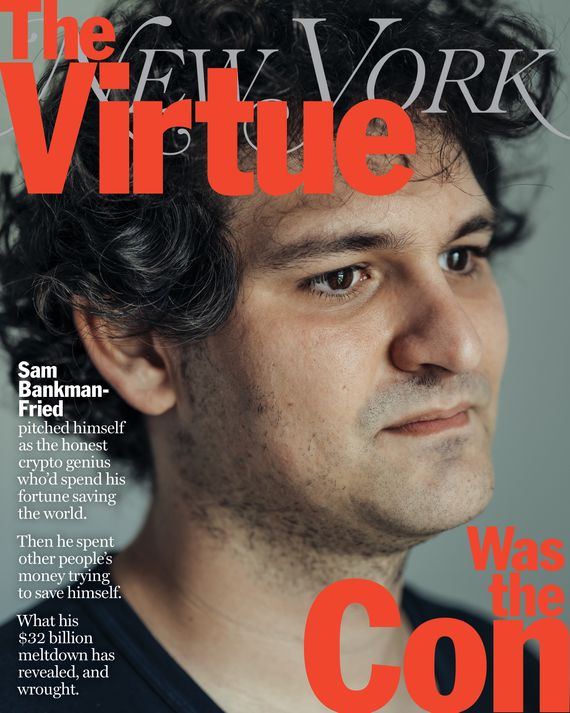
Everyone in Nassau is talking about it: At Café Matisse, an upscale restaurant near Parliament, two men loudly discuss the fallout from Sam Bankman-Fried’s leveled $32 billion business. At a small coffee shop in a mall across the street from the site where FTX planned to build a new headquarters, a local businessman approaches me to ask if I am “the FTX guy.” (I’m a white guy with dark curly hair, but come on.) Local radio stations report the news at the top of each broadcast. Rumors are everywhere about who got super-sized donations, the blowout parties at Bankman-Fried’s apartment held before the crash, luxury condos bought for multiples over asking price. “The Realtors here never made so much money in their life,” one developer tells me. Gone, though, are most of the signs and advertisements. Not that there were that many, anyway. While the company spent big to brand the arena for the Miami Heat, one of the few visible remnants of FTX here was the digital billboard above Customs at the airport. Employees who would wear company swag out to bars and restaurants downtown have pretty much all skipped the island.
In the Bahamas, where FTX has been headquartered since September 2021, the biggest question is who will get a piece of what’s left.
Central to the drama is corporate lawyer Brian Simms, who these days is a fixture on the front pages of local newspapers. He’s been appointed by the courts here to liquidate FTX’s extensive — in some cases, outrageous — assets. The full catalogue of those assets is still unknown, but part of the picture is nearly $75 million in real estate bought with company funds, potentially including Bankman-Fried’s $40 million penthouse in the remote gated community of Albany Marina. (It’s the five-bedroom with a pool overlooking the Atlantic, and he reportedly shared living space, and perhaps romantic entanglements, there with some top FTX employees.) The assets ultimately have to belong to someone, so the possibility that the wealth could stay in the Bahamas has made the proceedings urgent news.
Anything that used to belong to FTX is now frozen. That includes the firm’s old office complex. When I tried to drive into the corporate park this week, a guard checked my ID and took pictures of me and my car. Then he told me to scram — only people designated by Simms (who did not return a request to talk) are allowed in.
Even though Bankman-Fried is telling reporters that he is trying to raise $8 billion to save the company, it is already crystal clear that there is going to be a bankruptcy process. An important early question is which nation will control it. The Bahamian government is working overtime to do so, rather than let the bankruptcy courts in Delaware get the upper hand. Some of those hopes hang on Simms, a well-known litigator here who in the past represented financial institutions against Bernie Madoff. In an effort to wrangle the process out of Delaware, where Bankman-Fried filed for Chapter 11 relief (which would allow the company to recoup the money it owes customers and creditors over time), Simms is already making legal maneuvers that would shield FTX from lawsuits in the U.S. “The power to transfer the digital assets held by the FTX exchange is centralized in The Bahamas,” he wrote in a filing in New York bankruptcy court.
Simms is not working alone. On Thursday night, the Securities Commission of the Bahamas went further and assumed control over FTX’s assets, claiming that the company is not “a party to the US Chapter 11 bankruptcy proceedings” and transferring all of its digital assets into a government-controlled crypto wallet. In other words, it wouldn’t recognize U.S. law, and what happens from here on out is anyone’s guess. Bankman-Fried told Vox’s Kelsey Piper that he was hoping to “win a jurisdictional battle vs. Delaware”—which is to say, he wants the same outcome as the Bahamian government. (Why isn’t completely clear yet, but presumably he believes he would have a better hope of influencing the process here.)
The acrimony between FTX’s new management — the team brought in to unwind SBF’s mess — and the Bahamian authorities is palpable. FTX’s new CEO is trying to follow through on Bankman-Fried’s Chapter 11 filing in Delaware. But Bankman-Fried has said that he now regrets filing for Chapter 11, and the new CEO is accusing him of trying to “undermine” the Delaware bankruptcy proceedings and supporting the Bahamian government. The company is also suggesting the Bahamian government is improperly trying to funnel money away from FTX customers with funds stuck on the frozen exchange. “The Debtors thus have credible evidence that the Bahamian government is responsible for directing unauthorized access to the Debtors’ systems for the purpose of obtaining digital assets of the Debtors—that took place after the commencement of these cases,” the company wrote in a court filing.
In a sense, the Bahamas invited the chaos. FTX broke ground here only after the government passed a crypto-friendly law in 2020, called the DARE Act, that allowed companies like SBF’s to operate with light tax treatment and little regulatory oversight. Even in the wake of the company’s collapse, Prime Minister Philip Davis was defiant about his government’s role in the debacle, saying: “We have not identified any deficiencies in our regulatory framework that could have avoided this.”
If the pale, 30-year-old CEO is still holed up in his infamous penthouse, it apparently isn’t much of a change, since even prior to the bankruptcy, a public sighting was akin to “spotting a panda,” one developer at a small local crypto company told me. SBF’s home is located about as far from the country’s tourist-heavy area as you can get. You can’t eat dinner at Albany Marina without an invitation from someone who lives there, and staying a night at the hotel costs about $3,000. (I tried a few times to get inside. No dice).
But there is still the hole in the ground where FTX was going to build an impressive new headquarters. The plan was for a $60 million Gensler-designed building with a brilliant ocean view. Today, the sign that used to announce the new complex is gone and blue particleboard surrounds the site to dissuade gawkers.
The unfinished headquarters project may have been an early-warning sign of cracks in the company’s finances. At the start of the year, FTX was throwing money around, according to locals. Brendan and Danielle Lowe, who run the Orange Hill Beach Inn Hotel, a hillside resort with a majestic ocean view, say third parties, which they suspect worked on behalf of FTX, offered as much as $20 million for their property as soon as FTX moved in — a sum double what they might have expected. (The neighborhood made sense with fellow crypto firms Bitfinex and Tether preparing to open new offices a block away.) The Lowes declined all offers, but FTX had bought the lot next door. For months, workers were bulldozing, felling trees, laying down gravel, putting in a road, hauling in mobile offices, sometimes going as late as 10 p.m., says Brendan. Then, around the end of August, it went all quiet. The contractor on the project reports that its last meeting with FTX was in July.
Spending of a smaller variety was already starting to dry up. FTX employees were known here for their epic takeout meals. Orders of $5,000 a day apparently weren’t unusual. “They were our biggest corporate order at the time,” says Jessica Ferguson, a worker at NRG, a vegan restaurant a few minutes drive from FTX’s offices. (Bankman-Fried is a vegan.) But in the spring, she says, the orders mysteriously ceased.
This tense, unsettled state of affairs might not change for a while. Unless or until the U.S. extradites him, Bahamian authorities seem perfectly fine with letting Bankman-Fried live relatively unencumbered in his gated community. “It’s a pretty lawless place if you have money,” says a mate aboard a yacht owned by a fantastically wealthy foreign businessman. “If I got thrown in prison here, I know how I’d get out — money.”
More on sam bankman-fried
- The Effective Altruists’ Castle Is for Sale — and Has Become a Culture-War Meme
- Sam Bankman-Fried’s Final Trip to Court
- SBF Planned to ‘Come Out As Republican’ With Tucker Carlson
































